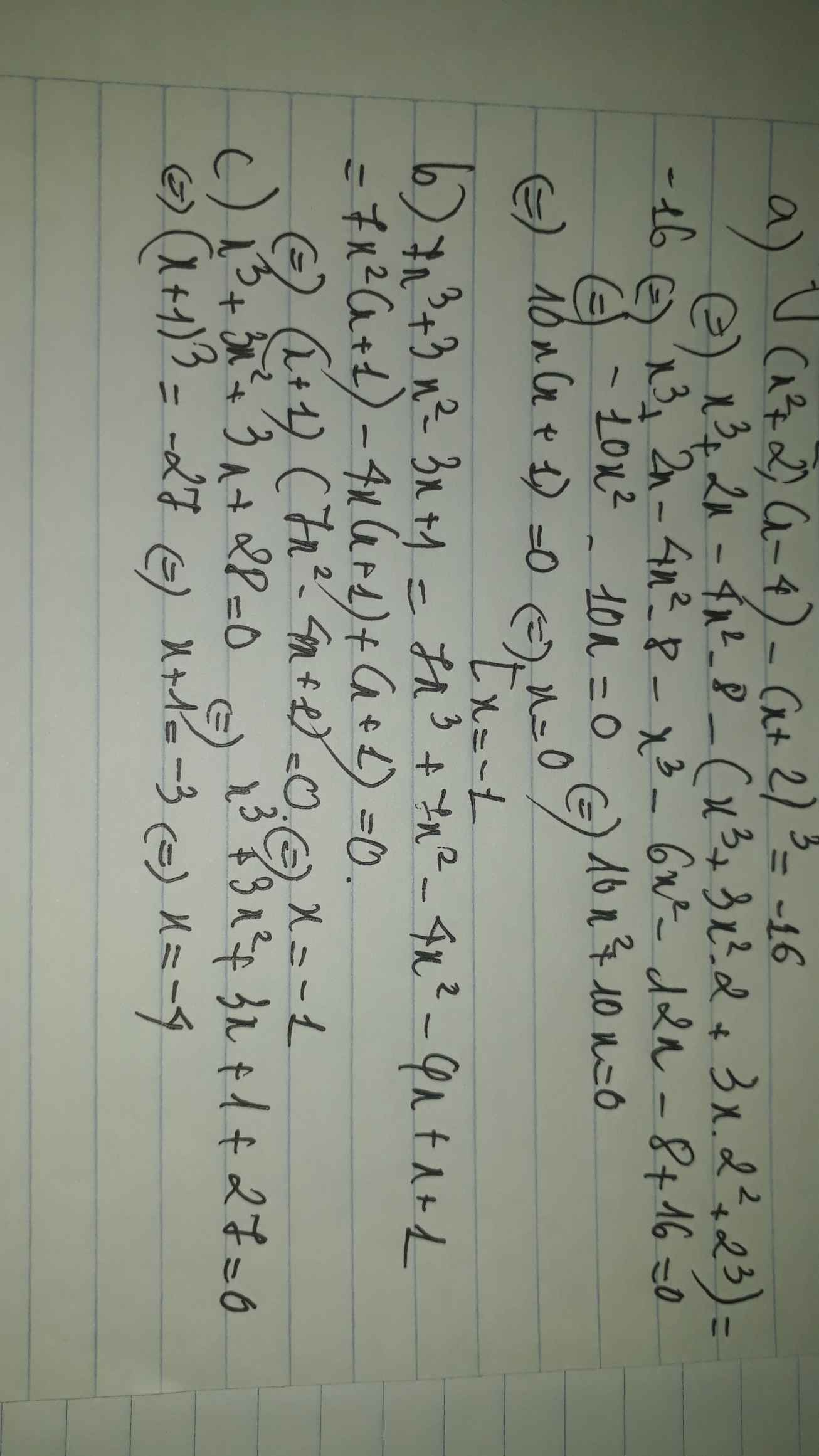Giải pt sau: x3 - 3x2 - 3x - 4 = 0

Những câu hỏi liên quan
Phân tích vế trái thành nhân tử, giải phương trình sau: x3 – 3x2 + 3x – 1 = 0
x3 – 3x2 + 3x - 1 = 0
⇔ (x – 1)3 = 0 (Hằng đẳng thức)
⇔ x – 1 = 0
⇔ x = 1.
Vậy tập nghiệm của phương trình là S={1}.
Đúng 0
Bình luận (0)
Bài 5: Giải các phương trình sau:a. (3x - 1)2 - (x + 3)2 0b. x3 dfrac{x}{49}c. x2 - 7x + 12 0d. 4x2 - 3x -1 0e. x3 - 2x - 4 0f. x3 + 8x2 + 17x +10 0g. x3 + 3x2 + 6x + 4 0h. x3 - 11x2 + 30x 0
Đọc tiếp
Bài 5: Giải các phương trình sau:
a. (3x - 1)2 - (x + 3)2 = 0
b. x3 = \(\dfrac{x}{49}\)
c. x2 - 7x + 12 = 0
d. 4x2 - 3x -1 = 0
e. x3 - 2x - 4 = 0
f. x3 + 8x2 + 17x +10 = 0
g. x3 + 3x2 + 6x + 4 = 0
h. x3 - 11x2 + 30x = 0
a. (3x - 1)2 - (x + 3)2 = 0
\(\Leftrightarrow\left(3x-1+x+3\right)\left(3x-1-x-3\right)=0\)
\(\Leftrightarrow\left(4x+2\right)\left(2x-4\right)=0\)
\(\Leftrightarrow4x+2=0\) hoặc \(2x-4=0\)
1. \(4x+2=0\Leftrightarrow4x=-2\Leftrightarrow x=-\dfrac{1}{2}\)
2. \(2x-4=0\Leftrightarrow2x=4\Leftrightarrow x=2\)
S=\(\left\{-\dfrac{1}{2};2\right\}\)
Đúng 3
Bình luận (0)
b. \(x^3=\dfrac{x}{49}\)
\(\Leftrightarrow49x^3=x\)
\(\Leftrightarrow49x^3-x=0\)
\(\Leftrightarrow x\left(49x^2-1\right)=0\)
\(\Leftrightarrow x\left(7x+1\right)\left(7x-1\right)=0\)
\(\Leftrightarrow x=0\) hoặc \(7x+1=0\) hoặc \(7x-1=0\)
1. x=0
2. \(7x+1=0\Leftrightarrow7x=-1\Leftrightarrow x=-\dfrac{1}{7}\)
3. \(7x-1=0\Leftrightarrow7x=1\Leftrightarrow x=\dfrac{1}{7}\)
Đúng 2
Bình luận (0)
*Cách khác:
a) Ta có: \(\left(3x-1\right)^2-\left(x+3\right)^2=0\)
\(\Leftrightarrow\left(3x-1\right)^2=\left(x+3\right)^2\)
\(\Leftrightarrow\left[{}\begin{matrix}3x-1=-x-3\\3x-1=x+3\end{matrix}\right.\Leftrightarrow\left[{}\begin{matrix}4x=-2\\2x=4\end{matrix}\right.\Leftrightarrow\left[{}\begin{matrix}x=-\dfrac{1}{2}\\x=2\end{matrix}\right.\)
Vậy: \(S=\left\{-\dfrac{1}{2};2\right\}\)
Đúng 2
Bình luận (0)
Xem thêm câu trả lời
Bài 6: Giải các phương trình sau:2) 3) 4) 5) 6) 7) 8) 9) 10) 11) 12) 13) 14) x2 – 2x + 1 015) 1 + 3x + 3x2 + x3 0
Đọc tiếp
Bài 6: Giải các phương trình sau:
2) |
3) |
4) |
5) |
6) |
7) |
8)
9)
10)
11)
12)
13)
14) x2 – 2x + 1 = 0
15) 1 + 3x + 3x2 + x3 = 0
4) Ta có: \(\dfrac{2x-5}{5}-\dfrac{x+3}{3}=\dfrac{2-3x}{2}-x-2\)
\(\Leftrightarrow\dfrac{6\left(2x-5\right)}{30}-\dfrac{10\left(x+3\right)}{30}=\dfrac{15\left(2-3x\right)}{30}-\dfrac{30\left(x+2\right)}{30}\)
\(\Leftrightarrow12x-30-10x-30=30-45x-30x-60\)
\(\Leftrightarrow-22x-60=-75x-30\)
\(\Leftrightarrow-22x+75x=-30+60\)
\(\Leftrightarrow53x=30\)
\(\Leftrightarrow x=\dfrac{30}{53}\)
Vậy: \(S=\left\{\dfrac{30}{53}\right\}\)
5) Ta có: \(\dfrac{5x-3}{6}-\dfrac{7x-1}{4}=5\)
\(\Leftrightarrow\dfrac{2\left(5x-3\right)}{12}-\dfrac{3\left(7x-1\right)}{12}=\dfrac{60}{12}\)
\(\Leftrightarrow10x-6-21x+3=60\)
\(\Leftrightarrow-11x-3=60\)
\(\Leftrightarrow-11x=63\)
\(\Leftrightarrow x=-\dfrac{63}{11}\)
Vậy: \(S=\left\{-\dfrac{63}{11}\right\}\)
Đúng 1
Bình luận (1)
`9,x^3+x^2-2=0`
`x^3-x^2+2x^2-2=0`
`<=>x^2(x-1)+2(x-1)(x+1)=0`
`<=>(x-1)(x^2+2x+2)=0`
`<=>x=1`
`14,x^2-2x+1=0`
`<=>(x-1)^2=0`
`<=>x-1=0`
`<=>x=1`
`15,x^3+3x^2+3x+1=0`
`<=>(x+1)^3=0`
`<=>x+1=0`
`<=>x=-1`
Đúng 2
Bình luận (0)
Bài 6: Giải các phương trình sau:1) 2) 3) 4) 5) 6) 7) 8) 9) 10) 11) 12) 13) 14) x2 – 2x + 1 015) 1 + 3x + 3x2 + x3 0
Đọc tiếp
Bài 6: Giải các phương trình sau:
1) |
2) |
3) |
4) |
5) |
6) |
7) |
8)
9)
10)
11)
12)
13)
14) x2 – 2x + 1 = 0
15) 1 + 3x + 3x2 + x3 = 0
Bài 6:
1) Ta có: \(2x\left(x-5\right)-\left(x+3\right)^2=3x-x\left(5-x\right)\)
\(\Leftrightarrow2x^2-10x-\left(x^2+6x+9\right)=3x-5x+x^2\)
\(\Leftrightarrow2x^2-10x-x^2-6x-9-3x+5x-x^2=0\)
\(\Leftrightarrow-14x-9=0\)
\(\Leftrightarrow-14x=9\)
\(\Leftrightarrow x=-\dfrac{9}{14}\)
Vậy: \(S=\left\{-\dfrac{9}{14}\right\}\)
Đúng 5
Bình luận (0)
`1)2x(x-5)-(x+3)^2=3x-x(5-x)`
`<=>2x^2-10x-x^2-6x-9=3x-5x+x^2`
`<=>x^2-16x-9=x^2-2x`
`<=>14x=-9`
`<=>x=-9/14`
Đúng 3
Bình luận (0)
Giải các phương trình sau:a)
x
+
3
3
−
x
−
1
3
0
;
b)
x
4
+
x
2
−
2
0
;
c)
x
3...
Đọc tiếp
Giải các phương trình sau:
a) x + 3 3 − x − 1 3 = 0 ;
b) x 4 + x 2 − 2 = 0 ;
c) x 3 + 3 x 2 + 6 x + 4 = 0 ;
d) x 3 − 6 x 2 + 8 x = 0 .
a) Cách 1: Khai triển HĐT rút gọn được 3 x 2 + 6x + 7 = 0
Vì (3( x 2 + 2x + 1) + 4 < 0 với mọi x nên giải được x ∈ ∅
Cách 2. Chuyển vế đưa về ( x + 3 ) 3 = ( x - 1 ) 3 Û x + 3 = x - 1
Từ đó tìm được x ∈ ∅
b) Đặt x 2 = t với t ≥ 0 ta được t 2 + t - 2 = 0
Giải ra ta được t = 1 (TM) hoặc t = -2 (KTM)
Từ đó tìm được x = ± 1
c) Biến đổi được ![]()
d) Biến đổi về dạng x(x - 2) (x - 4) = 0. Tìm được x ∈ {0; 2; 4}
Đúng 0
Bình luận (0)
tìm x thỏa mãn:
a) (x2+2)(x-4)-(x+2)3=-16
b) 7x3+3x2-3x+1=0
c) x3+3x2+3x+28=0
a: Ta có: \(\left(x^2+2\right)\left(x-4\right)-\left(x+2\right)^3=-16\)
\(\Leftrightarrow x^3-4x^2+2x-8-x^3-6x^2-12x-8=-16\)
\(\Leftrightarrow-10x^2-10x=0\)
\(\Leftrightarrow-10x\left(x+1\right)=0\)
\(\Leftrightarrow\left[{}\begin{matrix}x=0\\x=-1\end{matrix}\right.\)
c: Ta có: \(x^3+3x^2+3x+28=0\)
\(\Leftrightarrow\left(x+1\right)^3=-27\)
\(\Leftrightarrow x+1=-3\)
hay x=-4
Đúng 0
Bình luận (0)
bài 3 phân tích đa thức sau thành nhân tử
a 4x2 -16 + (3x +12) (4-2x)
b x3 + X2Y -15x -15y
c 3(x+8) -x2 -8x
d x3 -3x2 + 1 -3x
e 5x2 -5y2 -20x + 20y
kkk =0)
a) \(4x^2-16+\left(3x+12\right)\left(4-2x\right)\)
\(=\left(2x-4\right)\left(2x+4\right)-3\left(x+4\right)\left(2x-4\right)\)
\(=\left(2x-4\right)\left(2x+4-3x-12\right)\)
\(=-\left(2x-4\right)\left(x+8\right)\)
b) \(x^3+x^2y-15x-15y\)
\(=x^2\left(x+y\right)-15\left(x+y\right)\)
\(=\left(x+y\right)\left(x^2-15\right)\)
c) \(3\left(x+8\right)-x^2-8x\)
\(=3\left(x+8\right)-x\left(x+8\right)\)
\(=\left(x+8\right)\left(3-x\right)\)
d) \(x^3-3x^2+1-3x\)
\(=x^3+1-3x^2-3x\)
\(=\left(x+1\right)\left(x^2-x+1\right)-3x\left(x+1\right)\)
\(=\left(x+1\right)\left(x^2-x+1-3x\right)\)
\(=\left(x+1\right)\left(x^2-4x+1\right)\)
d) \(5x^2-5y^2-20x+20y\)
\(=5\left(x^2-y^2\right)-20\left(x-y\right)\)
\(=5\left(x-y\right)\left(x+y\right)-20\left(x-y\right)\)
\(=5\left(x-y\right)\left(x+y-4\right)\)
Đúng 2
Bình luận (0)
Giải các phương trình sau:a)
x
+
2
3
+
x
+
1
3
0
;
b)
2
x
4
+
3
x
2
−
5
0
;
c)
x...
Đọc tiếp
Giải các phương trình sau:
a) x + 2 3 + x + 1 3 = 0 ;
b) 2 x 4 + 3 x 2 − 5 = 0 ;
c) x 4 − 8 x 3 − 9 x 2 = 0 ;
d) x 3 − 4 x 2 + 4 − x = 0 .
Giải các phương trình sau trên tập số phức:
a) 2x2 + 3x + 4 = 0
b) 3x2 + 2x + 7 = 0
c) 2x4 + 3x2 – 5 = 0
cho pt 3x^2-5x-4=0
không giải pt hãy tính giá trị của biểu thức A=x1^3x2+x1x2^3
với x1, x2 là nghiệm của pt
Do \(\Delta=5^2+4\cdot3\cdot4=25+48=73>0\) nên PT có 2 nghiệm phân biệt.
Khi đó: \(\left\{{}\begin{matrix}x_1+x_2=\frac{-b}{a}=\frac{-\left(-5\right)}{3}=\frac{5}{3}\\x_1x_2=\frac{c}{a}=\frac{-4}{3}\end{matrix}\right.\)
Từ đây, ta suy ra:
\(A=x_1^3x_2+x_1x_2^3\\ =x_1x_2\left(x_1^2+x^2_2\right)\\ =x_1x_2\left(x_1^2+2x_1x_2+x^2_2-2x_1x_2\right)\\ =x_1x_2\left[\left(x_1+x_2\right)^2-2x_1x_2\right]\\ =\frac{-4}{3}\cdot\left[\left(\frac{5}{3}\right)^2-\frac{-4\cdot2}{3}\right]\\ =\frac{-4}{3}\cdot\frac{25-\left(-8\cdot3\right)}{9}\\ =\frac{-4}{3}\cdot\frac{25+24}{9}\\ =\frac{-4}{3}\cdot\frac{49}{9}=\frac{-196}{27}\)
Chúc bạn học tốt nha![]() .
.
Đúng 0
Bình luận (1)
Ta có:
A = x1x2(x12 + x22) = x1x2[(x1 + x2)2 - 2x1x2]
Ta có: \(\Delta=\left(-5\right)^2-4.3.\left(-4\right)=25+48>0\)
Áp dụng định lý Vi-ét với phương trình 3x2 - 5x - 4 ta có:
x1 + x2 = \(\frac{-\left(-5\right)}{3}=\frac{5}{3}\)
x1x2 = \(\frac{-4}{3}\)
Thay vào A ta được:
A = \(\frac{-4}{3}\left[\left(\frac{5}{3}\right)^2-2.\frac{-4}{3}\right]=\frac{-4}{3}.\left(\frac{25}{9}+\frac{8}{3}\right)=\frac{-4}{3}.\frac{49}{3}=\frac{-196}{3}\)
(P/s: CÓ thể SAI)
Đúng 0
Bình luận (0)























